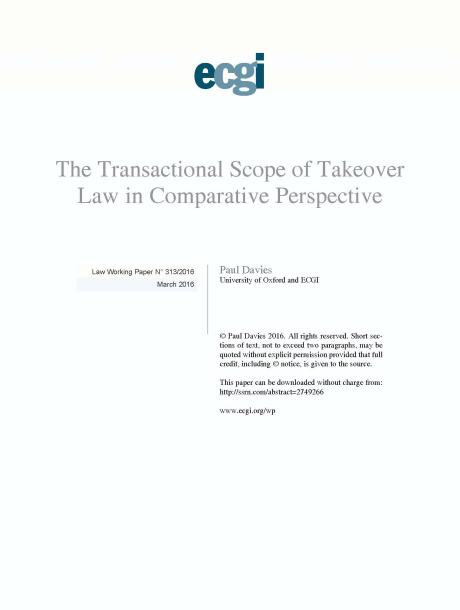
The Transactional Scope of Takeover Law in Comparative Perspective
Abstract
The core activity regulated by takeover codes is the voluntary offer by a bidder addressed to all the shareholders of a target company (other than the bidder) to acquire their shares in order to give the bidder control of the company. Around this core transaction, however, takeover codes regulate a range of other transactions. This paper explores four such transactions. Two of them are offers by persons already in control of the company: first, where the offer is made by the controller voluntarily (the ?consolidating? offer) and, second, where the offer is required by regulation (the mandatory bid rule). The third transaction is where shares move into the hands of an acquirer, not by reason of a contract between acquirer and shareholders, but by reason of powers conferred by statute. The clearest examples are statutory merger provisions and schemes of arrangement. The fourth transaction is a control shift produced by contract between company and shareholders or investors without any contracting between acquirer and existing shareholders. The example examined in detail is the share buy-back. The purpose of the analysis is to determine the rationale for applying rules formulated for general, voluntary offers to acquire control to these peripheral transactions ? either in full or in part. The focus of the analysis is on the UK Takeover Code and the variants of it which have been adopted in various Far East jurisdictions. To some extent the drafters of the UK Code faced the same problems as those in the other jurisdictions and the resulting rules have a high degree of commonality across the codes. However, the dominant shareholder structure of public companies in the other jurisdictions is very different from the dispersed UK pattern. The drafters of the non-UK codes have thus faced difficult issues about how to shape relations between controlling and non-controlling shareholders which the UK code is able to ignore or downplay. Some reference is also made to the law of Delaware, which, whilst not a Code jurisdiction, has an innovative approach to protection of minorities against controlling shareholders.







